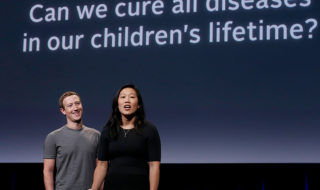CZ Biohub awards $13.7 million for new collaborative health research
Awards bring together experts from UC Berkeley, UCSF and Stanford
September 26, 2018
The Chan Zuckerberg Biohub (CZ Biohub), a nonprofit medical research organization, today announced that it is awarding $13.7 million over three years to support cutting-edge biomedical research from seven teams of scientists, physicians and engineers, with faculty members from UC Berkeley, UCSF and Stanford on each team.
The awards will fund two new programs: the CZ Biohub Microbiome Initiative and the CZ Biohub Intercampus Research Awards.
“We are thrilled by the extent to which these awards honor and support the notion that our most pressing challenges can only be surmounted by transcending the lines that have too long divided academic disciplines, departments and even institutions,” said UC Berkeley Chancellor Carol Christ. “The awards will also help support our efforts to extend the reach of world-class, fundamental research through initiatives that can speed the translation of discoveries into inventions and services for the benefit of all.”
“For the first time, these new awards bring together highly talented investigators from all three campuses to collaborate on promising new approaches to major biomedical problems,” said Joe DeRisi, co-president of CZ Biohub. “By drawing on the strengths of all three institutions, we believe these teams will accomplish what is now beyond the reach of individual investigators.”
Launched as a pilot program earlier this year, the CZ Biohub Microbiome Initiative provides $4 million over three years to carry out research on the community of microbes within the human body that influence many aspects of health, from nutrition and immune function to drug metabolism. The Microbiome Initiative brings together eight leading microbiome experts from all three campuses based on their complementary research interests.
Assembling the Microbiome Initiative team inspired CZ Biohub to create the Intercampus Research Awards. The new competitive awards program promotes collaborative research by bringing together clinicians, biologists, chemists, data scientists, mathematicians, engineers and bioethicists in teams that each include faculty members from all three campuses. The competition drew applications from 83 teams. CZ Biohub initially planned to support three teams but was inspired to increase the number of awards to six, providing $9.7 million over three years.
“This new collaborative team-based funding allows investigators across the three campuses to tackle demanding problems to enhance health,” said Steve Quake, co-president of CZ Biohub. “These research teams will shed new light on a diverse and challenging set of questions that will advance our understanding while developing technologies that open fresh avenues of research.”
“We launched the Biohub to bring together some of the brightest scientific minds in the Bay Area with world-class engineering teams, in order to help accelerate the pace of discovery and make faster progress in the fight against disease,” said Priscilla Chan and Mark Zuckerberg, co-founders of the Chan Zuckerberg Initiative and a pediatrician and founder of Facebook, respectively. “Just two years after its launch, it is incredible to see how the Biohub has helped spark promising new collaborations, tools, and research to enable and empower the entire scientific community.”
The CZ Biohub is an independent non-profit medical research organization collaborating with Stanford, UC Berkeley and UCSF to harness the power of science, technology and human capacity to cure, prevent or manage all disease during our children’s lifetime. For more information about the CZ Biohub, visit https://czbiohub.org.
RELATED INFORMATION

